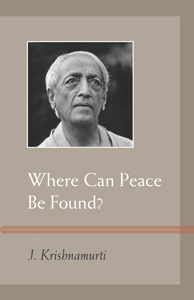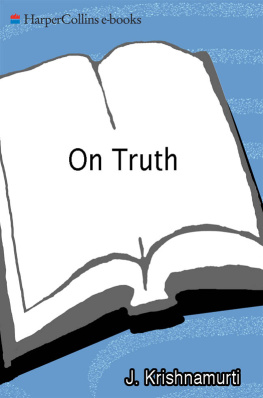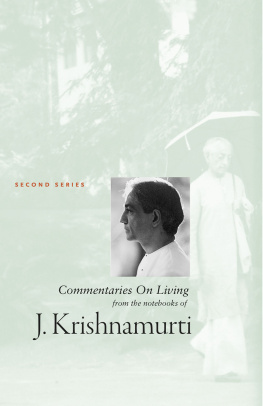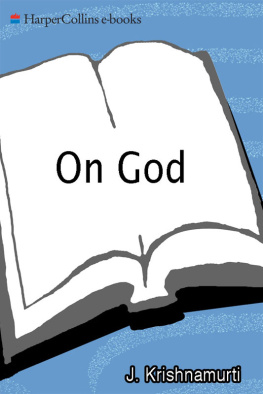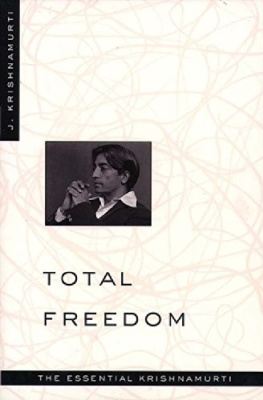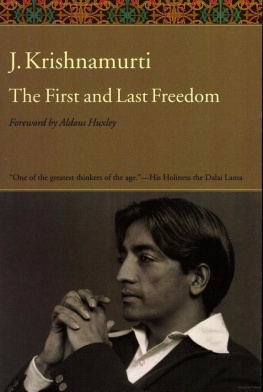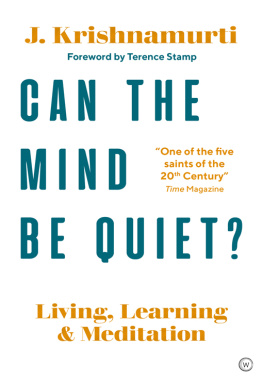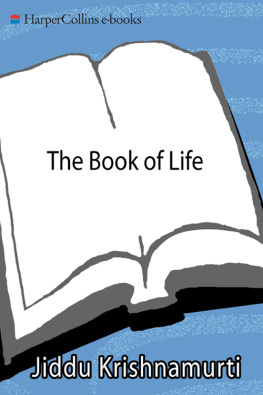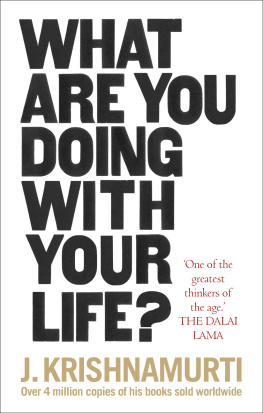Krishnamurti is one of the greatest philosophers of the age.
His Holiness the Dalai Lama
Few modern thinkers have integrated psychology, philosophy, and religion so seamlessly as Krishnamurti.
Publishers Weekly
ABOUT THE BOOK
J. KRISHNAMURTI was renowned for the penetrating insight and immediacy of his spiritual teaching. Radical in his day for seeking truth beyond the boundaries of religion, ideology, or tradition, he declared that Truth is a pathless land, and you cannot approach it by any path whatsoever. He traveled and lectured throughout the world, calling for a new approach to life and spirituality.
In this compilation of Krishnamurtis most essential teachings, he explores what he calls the art of living. The topics addressed include such perennial human concerns as: living life without conflict and confusion, how to act with skill and clarity, the significance of meditation, death and dying, true freedom, and bringing the sacred into everyday life. These timeless teachings guide us to live our lives simply, intelligently, and with great lovefree from the bonds of sorrow and fear.
JIDDU KRISHNAMURTI (18951986) was one of the most influential spiritual teachers of the twentieth century. He traveled and lectured throughout the world until his death at the age of ninety. His talks and works are preserved in more than seventy books.
Sign up to learn more about our books and receive special offers from Shambhala Publications.

Or visit us online to sign up at shambhala.com/eshambhala.
THE
Krishnamurti Reader
J. Krishnamurti

SHAMBHALA
Boston & London
2011
Shambhala Publications, Inc.
Horticultural Hall
300 Massachusetts Avenue
Boston, Massachusetts 02115
www.shambhala.com
2009 by Krishnamurti Foundation Trust, Ltd
Brockwood Park, Bramdean Hampshire so24 0LQ England
This book was previously published as The Pocket Krishnamurti.
Edited by Ray McCoy
All rights reserved.
No part of this book may be reproduced in any form or by any means, electronic or mechanical, including photocopying, recording, or by any information storage and retrieval system, without permission in writing from the publisher.
Library of Congress Cataloging-in-Publication Data
Krishnamurti, J. (Jiddu), 18951986.
[Selections. 2011]
The Krishnamurti reader / J. Krishnamurti1st ed.
p. cm.
eISBN 978-0-8348-2759-2
ISBN 978-1-59030-938-4 (pbk.: alk. paper)
1. Hindu philosophy. I. title
B5134.K752E5 2011
181.4DC22
CONTENTS
The Art of Living
D O WE SOMETIMES FEEL that we waste our lives, that they are without meaning, full of conflict and confusion around us and within us? In this collection, comprised mostly of unpublished talks given in California, England, and Switzerland, Krishnamurti considers these feelings, and suggests that there is a way of living daily life that is entirely different from what it normally isa way of living without any control, without any conflict, yet without conformity. He says that life can have great beauty and significance if there is clear observation of what is actually happening in our actions and reactions, in our relationships. Human beings have tremendous capacity but we are conditioned to solve problems; this denies freedom. When we recognize our conditioning, Krishnamurti explains, we reject psychological authority, and may then observe and act with greater clarity. With observation free of words and thought, we can see that freedom, love, beauty, and goodness are one, not separate.
Krishnamurti speaks of an art of living a life in which there is no conflict whatsoever, one that is totally free of fear, including the fear of death. We can understand the root of fear and the cause of sorrow if we look at our conditioning. In this way we see that thought is a process of time and memory that interferes with direct perception. Understanding what prevents order in consciousness, and so in our lives, depends on the arts of listening, seeing, and learning. Krishnamurti discusses each of these in simple words with the freshness of truth.
In these talks, which Krishnamurti described as conversations between us and him, there is a quality of meditation in which we may glimpse a timeless emptiness that is, perhaps, sacred, with meaning beyond words.
RAY MCCOY
T HE GREATEST ART is the art of living, greater than all things that human beings have created by mind or hand, greater than all the scriptures and their gods. It is only through this art of living that a new culture can come into being. This art of living can come only out of total freedom.
This freedom is not an ideal, a thing to take place eventually. The first step in freedom is the last step in it. It is the first step that counts, not the last step. What you do now is far more essential than what you do at some future date. Life is what is happening this instant, not an imagined instant, not what thought has conceived, so it is the first step you take now that is important. If that step is in the right direction, then the whole of life is open to you. The right direction is not toward an ideal, a predetermined end, it is inseparable from what is taking place now. This is not a philosophy as a series of theories; it is exactly what the word philosophy means, the love of truth, the love of life. It is not something that you go to a university to learn. We are learning about the art of living in our daily life.
As life is so complex, it is always difficult and confusing to pick one aspect and say it is the most important. The very choice, the differentiating quality, leads to further confusion. If you say this is the most important, then you relegate the other facts of life to a secondary position. Either we take the whole movement of life as one, which becomes extremely difficult for most people, or we take one fundamental aspect in which all the others may be included. Let us go into it very slowly and hesitantly.
We are exploring together one facet of life, and in the very understanding of it we may cover the whole field of life. To investigate, we must be free of our prejudices, personal experiences, and predetermined conclusions. Like a good scientist, we must have a mind unclouded by knowledge that we have already accumulated. We must come to it afresh, without any reaction to what is being observed. This is absolutely necessary; otherwise investigation is colored by our own fears, hopes, and pleasures. The very urge to investigate, and the intensity of it, frees the mind from its coloring.
One of the most important things is the art of living. Is there a way of living our daily life that is entirely different from what it normally is? Is there a way of living without any control, without any conflict, without a disciplinary conformity? I can find out only when my whole mind is facing exactly what is happening now. This means I can find out what it means to live without conflict only when what is happening now can be observed.
This observation is not an intellectual or emotional affair but acute, clear, sharp perception in which there is no duality, no opposition or contradiction in what is going on. Duality arises only when there is an escape from what is. This escape creates the opposite and so conflict arises. There is only the actual and nothing else.
Associations and reactions to what is happening are the conditioning of the mind. This conditioning prevents the observation of what is taking place now. What is taking place now is free of time. Time is the evolution of our conditioning. It is humanitys inheritance, the burden that has no beginning. When there is this passionate observation of what is going on, that which is being observed dissolves into nothingness. An observation of anger that is taking place now reveals the whole nature and structure of violence. This insight is the ending of all violence.
Next page
